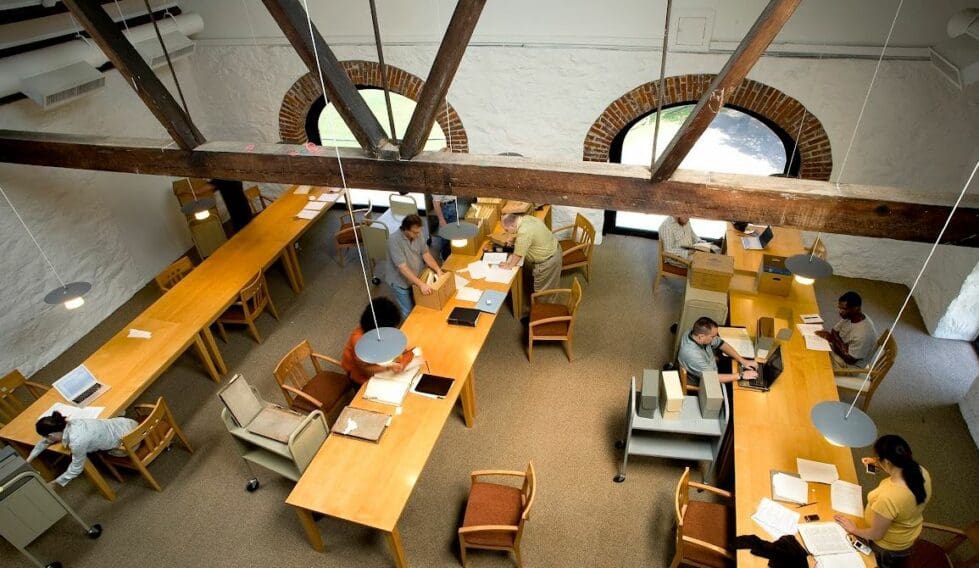
Researchers now will be able to dive into an archive of former Gov. Pete du Pont’s records in the Hagley Museum and LIbrary’s Reading Room.
A collection of Pete du Pont’s papers is now open to the public at Hagley Museum and Library.
It includes decades 0f the former Delaware governor’s public writing, as well as photos, scrapbooks, recordings and correspondence with family members.
Among the material in the archive are items related to du Pont’s 1988 campaign to be the Republican nominee for president of the United States and du Pont’s push to bring credit card processing facilities to the First State after the Dupont Corp. became a lesser force in Delaware’s economy.
That move shifted Delaware’s unemployment rate to the lowest in the nation at the time.
Eric Rau, director of the Hagley Library, said he found some of the presidential campaign material particularly interesting.
“Just how he ran the campaign, when he started and when he stopped,” Rau said. “There’s material there about managing the campaign.”
du Pont would go on to cede to George H.W. Bush, who became the Republican nominee and was elected president.
The collection springs from a partnership with Pete du Pont Freedom Foundation, chaired by Pete’s son, Thère du Pont.
The initiative makes Pete du Pont’s papers available to a wider audience as his foundation celebrates its 20th anniversary, Thère said in a Hagley press release.
Rau said the two organizations began talking about the archive about three years ago. The materials arrived at Hagley shortly before the governor died May 8, 2021.
Hagley is a former du Pont estate that includes the first du Pont family home and garden in the United States, the company’s first powder yards and a 19th-century machine shop, as well as a library that focuses on materials related to the history of American business and technology.
Pete, whose full name was Pierre S. du Pont IV, was the great nephew of Pierre S. du Pont, who developed Longwood Gardens.
The former governor also was an attorney, state legislator, member of Congress, commentator, and columnist
When the du Pont administration began, Delaware faced enormous challenges, including a financial structure that drove employers away, the Hagley release said.
du Pont was able to win the confidence of the Democrats and pass the 1981 Financial Center Development Act with bipartisan support. It opened doors for national banks and credit card companies to start their operations in Delaware.
That created thousands of new jobs and transformed the Wilmington skyline in a way no other single piece of legislation has done, the release said.
DELAWARE BUDGET: Revenues fall slightly as state noses into post-COVID era
DELAWARE SCHOOLS: 43 to compete for 23 school board seats
du Pont also co-founded Leadership Delaware and founded Jobs for Delaware Graduates, a workforce preparation program for high school students.
The foundation was established in 2003 to honor du Pont, but also highlight Delaware innovation and projects that reduced the barriers to private enterprise.
Many of the records relating to du Pont’s years as governor are in the state archives, Rau said.
du Pont collection
The Hagley collection includes decades of du Pont’s writing for different publications and organizations, including The Wall Street Journal, the National Center for Policy Analysis, OpinionJournal.com and IntellectualCapital.com.
The collection fills 28 feet of shelving, with thousands of documents, more than 500 photographs, and scores of videocassettes, scrapbooks, recordings and other materials.
The digitized material is at petedupontfreedomfoundation.org and hagley.org/pdpont.
A full inventory of the Hagley archive is at hagley.org/pdupont. That information allows researchers to know what’s in the collection down to the folder it’s in.
To see material in person, researchers should check online and then use [email protected] or call the reading room at 302-658-2400 to make an appointment at least a week before the researcher would like to visit.
First-time researchers must apply for a research card, which Rau said is a 5-minute process.

Betsy Price is a Wilmington freelance writer who has 40 years of experience, including 15 at The News Journal in Delaware.
Share this Post





